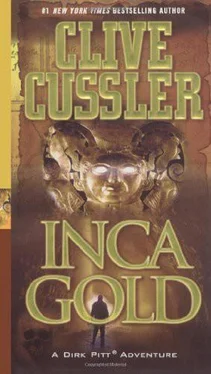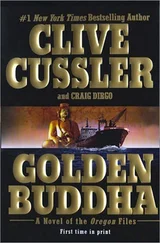"Big believers in you can take it with you," said Giordino.
"From the Neanderthals to the Egyptians to the Incas," Ortiz continued, "they all believed in a continued life in the great beyond. Not reincarnation, mind you. But life as they lived on earth. So they believed in taking their most prized possessions with them into the grave. Many kings and emperors also took along their favorite wives, officials, soldiers, servants, and prized animals as well as treasure. Grave robbing is as old as prostitution."
"A pity U.S. leaders don't follow in their footsteps," said Giordino sardonically. "Just think, when a President dies, he could order that he be buried with the entire Congress and half the bureaucracy."
Pitt laughed. "A ritual most American citizens would applaud."
"Many of my countrymen feel the same about our government," Ortiz agreed.
Gunn asked, "How do they locate the graves?"
"The poorer huaqueros search with picks and shovels and long metal rods to probe for buried tombs. The wellfunded theft and smuggling organizations, on the other hand, use modern, expensive metal detectors and lowlevel radar instruments."
"Have you crossed paths with the Solpemachaco in the past?" asked Pitt.
"At four other historical sites." Ortiz spat on the ground. "I was always too late. They're like a stench with an unknown source. The organization exists, that much is certain. I have seen the tragic results of their pillage. But I have yet to find hard evidence leading to the bastards who make the payoffs to the huaqueros and then smuggle our cultural heritage into an international underground market."
"Your police and security forces can't put a stop to the flow of stolen treasures?" asked Gunn.
"Stopping the huaqueros is like trying to catch mercury in your hands," answered Ortiz. "The profit is too enormous and there are too many of them. As you have found out for yourselves, any number of our military and government officials can be bought."
"You have a tough job, Alberto," Pitt sympathized. "I don't envy you."
"And a thankless one," Ortiz said solemnly. "To the poor hill people, I am the enemy. And the wealthy families avoid me like the plague because they collect thousands of precious artifacts for themselves."
"Sounds as if you're in a no-win situation."
"Quite true. My colleagues from other cultural schools and museums around the country are in a race to discover the great treasure sites, but we always lose to the huaqueros."
"Don't you receive help from your government?" asked Giordino.
"Obtaining funding from the government or private sources for archaeology projects is an uphill battle. A pity, but it seems no one wants to invest in history."
The conversation drifted to other subjects after one of Ortiz's assistants announced that dinner was ready. Two courses consisted of a pungent beef stew accompanied by bowls of locally grown parched corn and beans. The only touches of more refined dining came from an excellent Peruvian red wine and a fruit salad. Dessert consisted of mangos with syrup.
As they gathered around a warm campfire, Pitt asked Ortiz, "Do you think Tupac Amaru and his men have totally stripped the City of the Dead, or are there tombs and buildings that are still undiscovered?"
Ortiz suddenly beamed like a strobe light. "The huaqueros and their Solpemachaco bosses were here only long enough to loot the obvious, the artifacts easily found on the surface. It will take years to conduct a thorough archaeological excavation of the Pueblo de los Muertos. I fervently believe the bulk of the treasures have yet to be found."
Now that Ortiz was in a happy mood, his stomach warmed by numerous glasses of white brandy, Pitt circled around from left field. "Tell me, Alberto, are you an expert on legends dealing with lost Inca treasure after the Spanish came?"
Ortiz lit a long, narrow cigar and puffed until the end turned red and smoke curled into the dank and increasingly cold night air. "I only know of a few. Tales of lost Inca treasure might not be found in abundant lots if my ancestral cultures had made detailed accounts of their everyday existence. But unlike the Mayans and Aztecs of Mexico, the cultures of Peru did not leave behind an abundance of hieroglyphic symbols. They never devised an alphabet or ideographic system of communication. Except for a scattering of designs on buildings, ceramic pots, and textiles, the records of their lives and legends are few."
"I was thinking of the lost treasure of Huascar," said Pitt.
"You've heard of that one?"
"Dr. Kelsey recounted it. She described an immense golden chain that sounded a bit farfetched."
Ortiz nodded. "That part of the legend happens to be true. The great Inca king, Huayna Capac, decreed that a huge gold chain be cast in honor of the birth of his son, Huascar. Many years later, after Huascar succeeded his father as king, he ordered the royal treasure to be smuggled from the Inca capital at Cuzco and hidden to keep it out of the hands of his brother Atahualpa, who later usurped the kingdom after a lengthy civil war. The vast hoard, besides the golden chain, included life-size statues, thrones, sun disks, and every insect and animal known to the Incas, all sculpted in gold and silver and set with precious gems."
"I've never heard of a treasure that grand," said Gunn.
"The Incas had so much gold they couldn't understand why the Spanish were so fanatical for it. The craze became part of the El Dorado fable. The Spanish died by the thousands searching for the treasure. The Germans and the English, who included Sir Walter Raleigh, all scoured the mountains and jungles, but none ever found it."
"As I understand it," said Pitt, "the chain and the other art treasures were eventually transported to a land beyond the Aztecs and buried."
Ortiz nodded. "So the story goes. Whether it was actually taken north by a fleet of ships has never been verified. It was reasonably proven, however, that the hoard was protected by Chachapoyan warriors who formed the royal guard for Inca kings after their confederation was conquered by Huayna Capac in 1480."
"What is the history of the Chachapoyas?" asked Gunn.
"Their name means Cloud People," replied Ortiz. "And their history has yet to be written. Their cities, as you well know from recent experience, are buried in one of the most impenetrable jungles of the world. As of this date, archaeologists have neither the funds nor the means to conduct extensive surveys and excavations on Chachapoyan ruins."
"So they remain an enigma," said Pitt.
"In more ways than one. The Chachapoya people, according to the Incas, were fair-skinned, with blue and green eyes. The women were said to be very beautiful and became highly prized by both the Incas and the Spanish. They were also quite tall. An Italian explorer found a skeleton in a Chachapoyan tomb that was well over two meters."
Pitt was intrigued. "Close to seven feet?"
"Easily," Ortiz answered.
"Any possibility they might have been descendants of early explorers from the Old World, perhaps the Vikings who might have sailed across the Atlantic, up the Amazon, and settled in the Andes?"
"Theories of early transoceanic migration to South America across both the Atlantic and the Pacific have always abounded," answered Ortiz. "The fancy term for pre-Columbian travel to and from other continents is diffusionism. An interesting concept, not well accepted but not entirely ignored either."
"Is there evidence?" asked Giordino.
"Mostly circumstantial. Ancient pottery found in Ecuador that has the same designs as the Ainu culture of northern Japan. The Spanish, as well as Columbus, reported seeing white men sailing large ships off Venezuela. The Portuguese found a tribe in Bolivia whose beards were more magnificent than the Europeans', contrary to the fact that most Indians lacked abundant facial hair. Reports of -livers and fishermen finding Roman or Grecian amphorae in the waters off Brazil come up routinely."
Читать дальше












